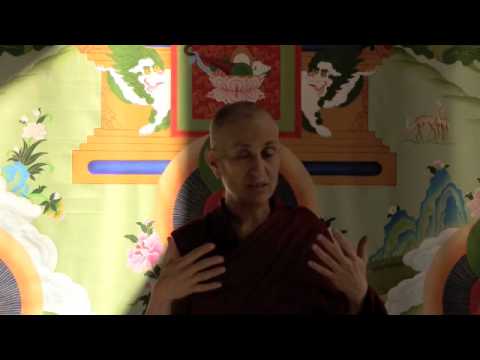Six root afflictions: Recognizing doubt
Stages of the Path #102: The Second Noble Truth
Part of a series of Bodhisattva's Breakfast Corner talks on the Stages of the Path (or Lamrim) as described in the Guru Puja text by Panchen Lama I Lobsang Chokyi Gyaltsen.
We were talking about doubt yesterday, and as I said, it’s quite difficult to recognize, and it’s possible to go for years not recognizing doubt that’s in the mind. So, I want to talk a bit today about how to recognize doubt. One thing is to watch whether your mind is spinning around the same questions again and again and again. It’s like you have a question, but you’re not really seeking answers. Rather, you’re just turning around the question again and again and again.
We’re talking about the negative kind of doubt here. Another way to recognize doubt is if you ask a question and someone gives you an answer, but your first reaction is, “Yes, but.” [laughter] You know that answer? Also, it’s helpful to check whether your mind is even willing to think about what someone says when they do give you an answer. Instead, you might just brush it off: “That’s superficial,” or “Oh, they always say that,” or “They’ve said that before.” In other words, our mind doesn’t want to seriously engage with any possible answers that people give. Be on the lookout for those kinds of things.
Also, doubt over a long time can really cause a certain kind of anger and unhappiness in the mind. Especially when we have the attitude of “Prove it to me,” there’s a lot of anger underlying that. “It’s not my responsibility. You prove it to me.” There’s a lot of moodiness and anger at the teachings or the teacher. That can be indicative of some kind of doubt that’s been held over a long period of time that we haven’t been able to resolve.
The way to resolve it is to ask questions and to think about things. If the mind is thinking, “They’re telling me what to believe, and I have no choice about what to believe,” or “I’ve got to accept this or else,” then recognize that that’s not the Buddhist approach to learning. Nobody is forcing anything on us. The whole idea of the path is that we use our intelligence and our ability to critically investigate and that we think about things.
Sometimes that doubt can happen because we have some authority issues mixed in there, or maybe because in our religion of origin we felt like we had to believe or we were bad, or maybe we’d get hit on the head with a ruler. [laughter] We have all sorts of assumptions lurking in the back of our minds that can cause these kinds of blockages in our practice.
Sometimes just noticing these old habits and assumptions can be a big relief in terms of letting go of them, and letting go of the doubt. Also, though, don’t think that just recognizing them is going to result in them all going away. We have to keep steering our mind towards a correct approach and the correct view, and we have to keep using our intelligence to investigate.
Venerable Thubten Chodron
Venerable Chodron emphasizes the practical application of Buddha’s teachings in our daily lives and is especially skilled at explaining them in ways easily understood and practiced by Westerners. She is well known for her warm, humorous, and lucid teachings. She was ordained as a Buddhist nun in 1977 by Kyabje Ling Rinpoche in Dharamsala, India, and in 1986 she received bhikshuni (full) ordination in Taiwan. Read her full bio.


